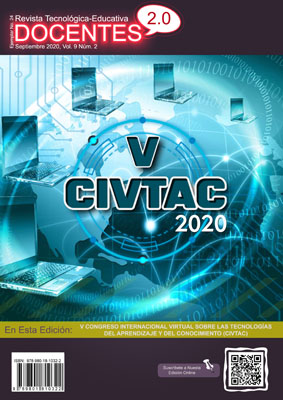Socratic Method in the Active Learning of Philosophy of Education Students- UNSCH 2019
 DOI:
https://doi.org/10.37843/rted.v9i2.136
DOI:
https://doi.org/10.37843/rted.v9i2.136
Main Article Content
Abstract
The Socratic method or dialogue is a method of dialectic or logical parley for the investigation of new ideas or philosophical themes in general and of their disciplines. The present research was carried out with the objective of determining the influence of the Socratic method in the active learning of philosophy of the students of the Faculty of Education Sciences-UNSCH 2019. In this sense, an explanatory research with a quantitative approach was carried out in the paradigm positivist with experimental and comparative methods to determine the influence of an independent variable on another dependent variable. The Socratic method in the active learning of philosophy, whose geographical space corresponds to the Faculty of Education Sciences of the National University of "San Cristóbal de Huamanga", said sample was made up of 48 students from the Professional School of Initial Education of said Faculty of series 100 or first year, curiously made up of only women, forming two groups at the discretion of the researcher: one control and the other experimental. The results refer after applying the Socratic method to the experimental group, the average index of active philosophy learning significantly increased compared to those who were not exposed to this method. In conclusion, the Socratic method significantly influences the active learning of philosophy in the experimental group compared to the control group who do not apply this method in the Faculty of Education Sciences, according to the universal statistical parameter "T" of Student (? <0.05).
Downloads
Metrics
Article Details

This work is licensed under a Creative Commons Attribution-NonCommercial-NoDerivatives 4.0 International License.
Those authors who have publications in our journal accept the following terms:
- When a work is accepted for publication, the author retains rights of reproduction, distribution of his/her article for exploitation in all countries of the world in the format provided by our magazine and any other magnetic medium, optical, and digital.
- Authors will retain their copyright and guarantee the journal the right first to publish their work, which will be simultaneously subject to the Creative Commons Acknowledgment License (Attribution-NonCommercial-NoDerivatives 4.0 International (CC BY-NC-ND 4.0)). That allows third parties to copy and redistribute the material in any medium or format, under the following conditions: Acknowledgment - You must properly acknowledge authorship, provide a link to the license, and indicate if any changes have been made. You may do so in any reasonable way, but not in a way that suggests you have the licensor's endorsement or receive it for your use. NonCommercial - You may not use the material for a commercial purpose. NoDerivatives - If you remix, transform, or build from the material, you cannot broadcast the modified material. There are no additional restrictions - You cannot apply legal terms or technological measures that legally restrict you from doing what the license allows.
- Authors may adopt other non-exclusive license agreements to distribute the published version of the work (e.g., deposit it in an institutional archive or publish it in a monographic volume) provided that the initial publication in this journal is indicated.
- Authors are allowed and recommended to disseminate their work through the Internet (e.g., in institutional telematic archives, repositories, libraries, or their website), producing exciting exchanges and increasing the published work's citations.
- Request of withdrawal an article has to be done in writing by the author to the Editor, becoming effective after a written response from the Editor. For this purpose, the author or authors will send correspondence via e-mail: [email protected].
- The author will not receive financial compensation for the publication of his work.
- All Docentes 2.0 Journal publications are under the Open Journal System (OJS) platform at: https://ojs.docentes20.com/.
References
Abbagnano, N. et al. (1971). La Evolución de la dialéctica. Ediciones Martínez Roca.
Atao Rivas, David (2017) Método socrático en la comprensión de textos filosóficos de los estudiantes universitarios UNSCH, Ayacucho [tesis de maestría no publicada, Universidad de Huamanga]. Repositorio institucional UNSCH. http://biblioteca.unsch.edu.pe/cgi-bin/koha/opac-MARCdetail.pl?biblionumber=4264
Barylko, J. (2001) La filosofía: Una Invitación a Pensar. Editorial Planeta.
Brenifier O. (2007) La naturaleza del filosofar. Recuperado de: http://www.pratiques-philosophiques.fr/es/blog-es/
De La Torre, A. (2003) Método Socrático y el método Van Hiele. Colombia: Universidad de Antioquía Medellín.
Dynnik. M. T. (1962) Historia de la filosofía. Editorial Grijalbo.
Laercio, D. (2002) Vidas de filósofos ilustres. Editorial Omega.
Najarro-Rúa, A. (2011) Método socrático en la criticidad de los estudiantes UNSCH, Ayacucho [tesis de maestría no publicada, Universidad de Huamanga] repositorio institucional UNSCH. Recuperado de: http://repositorio.unsch.edu.pe/handle/UNSCH/1347
Paúl, R. & Elder, L. (1997) Enseñanza Socrática. Ediciones fundación para el pensamiento crítico.
Platón (1971) Apología a Sócrates. Editorial Eudeba.
Sierra-Gómez, H. (2013) El aprendizaje activo como mejora de las actitudes de los estudiantes hacia el aprendizaje. Ediciones UPNA.
Rosental, M. (2008) Diccionario filosófico. Ediciones Pueblos Unidos.






